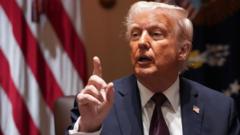In the latest escalation of trade tensions, President Trump has issued a stern warning via social media, suggesting that the U.S. would impose significant tariffs on both the European Union and Canada should these entities conspire to harm the American economy. The rising stakes in this trade war may compel both sides to reassess their strategic alliances and diplomatic relations.
Trump Issues Warning to EU and Canada Over Economic Cooperation

Trump Issues Warning to EU and Canada Over Economic Cooperation
President Trump threatens large-scale tariffs if Canada and the EU collaborate against the U.S., escalating trade tensions.
President Trump expressed his concerns in a late-night social media post on Thursday, indicating that if the European Union collaborates with Canada to "do economic harm" to the United States, he would impose "large scale" tariffs. This warning adds another layer to the ongoing trade conflict that has already seen tariffs on goods such as steel, aluminum, and automobiles.
The European Union, heavily reliant on trade with the United States, now faces instability in its market relations as it grapples with potential increased tariffs, prompting frantic negotiations to shield its economic interests. Trade Commissioner Maros Sefcovic pointed out the challenges, stating that finding common ground is difficult when progress from the U.S. seems elusive.
This environment has led Europe and Canada to consider strengthening their economic ties. Fears regarding military support from the U.S. have pushed these partners closer as they explore collaborative efforts, such as Canada’s involvement in Europe’s military enhancement initiatives. The prevailing tension raises questions about the future of transatlantic relationships and economic cooperation in a climate marked by uncertainty and potential adversarial policies.
As the situation continues to evolve, both the EU and Canada will need to navigate the complexities introduced by Trump's unilateral approach to trade and policy, balancing their responses while seeking to protect their economic foundations.
The European Union, heavily reliant on trade with the United States, now faces instability in its market relations as it grapples with potential increased tariffs, prompting frantic negotiations to shield its economic interests. Trade Commissioner Maros Sefcovic pointed out the challenges, stating that finding common ground is difficult when progress from the U.S. seems elusive.
This environment has led Europe and Canada to consider strengthening their economic ties. Fears regarding military support from the U.S. have pushed these partners closer as they explore collaborative efforts, such as Canada’s involvement in Europe’s military enhancement initiatives. The prevailing tension raises questions about the future of transatlantic relationships and economic cooperation in a climate marked by uncertainty and potential adversarial policies.
As the situation continues to evolve, both the EU and Canada will need to navigate the complexities introduced by Trump's unilateral approach to trade and policy, balancing their responses while seeking to protect their economic foundations.






















